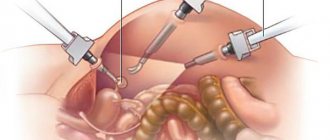Many factors can contribute to the occurrence of headaches in women, including heredity and age. There is a proven connection between headaches and hormonal changes.
The hormones estrogen and progesterone play a key role in regulating the menstrual cycle and pregnancy. They may also interfere with the chemicals that cause headaches. So a stable level of estrogen reduces pain, but with a decrease in its concentration, the pain intensifies.
Headache during the menstrual cycle
The content of the article
A decrease in estrogen just before menstruation leads to migraines. Therefore, many women have headaches before or during menstruation. In this case, the general condition is aggravated by unpleasant sensations in the stomach, dizziness, nausea, and emotional outbursts.
This condition requires treatment by a gynecologist-endocrinologist, since hormonal problems are dangerous and have other consequences. If you ignore the symptoms of hormonal imbalance, you can get early menopause, metabolic disorders with obesity, irregular periods, infertility and other problems.
What happens during menstruation
During the entire cycle, the body prepares for possible motherhood; the hormone progesterone is intensively produced. If conception does not occur, its quantity decreases sharply, and prostaglandin hormones begin to be produced, which cause the onset of menstruation.
There is a narrowing of the vessels of the endometrium of the uterus, as a result of which its blood supply decreases. The mucous membrane begins to gradually exfoliate and separate from the uterus. Its remains are excreted together with the blood that accumulates due to ruptures of small vessels.
This process does not happen gradually. Some parts of the mucous membrane begin to disintegrate earlier, and some a little later. That is why critical days last from three to five days.
In parallel with the natural removal of exfoliated endometrium, a new layer of it grows. We can say that menstruation is a transitional moment from one cycle to the next.
Menstrual fluid consists of blood and secretions secreted by the glands of the uterus. In addition, it contains vaginal epithelial cells and mucous particles. A woman loses approximately 50 g to 80 g of blood during one menstruation.
On critical days, unpleasant sensations may often occur, such as:
- Pain in the lower abdomen. When visiting a doctor, girls often note that their ovaries hurt during menstruation. But in fact, pain in the lower abdomen is associated with contractions of the uterus during menstruation. Special medications will help eliminate pain.
- Unpleasant odor of menstrual discharge, causing discomfort to women.
- Nausea and fever.
Remember that hygiene is the key to women's health. You need to pay special attention to hygiene on critical days. You should take a shower at least twice a day, change pads every four hours, and wear comfortable underwear made from natural fabrics.
How to help yourself with menstrual migraines
The following methods are effective for treating menstrual migraine:
- Cold compress.
Apply a cold cloth or ice pack to the painful area on your head or neck. - Relaxation exercises and acupuncture.
Acupuncture, like relaxation exercises, stimulates various systems in the body and helps reduce headaches and stress. Exercise improves blood circulation and, among other things, increases lung capacity. Aerobic exercise is recommended for women with migraines as a way to counteract the cause of the symptoms. - Over-the-counter pain relievers.
The gynecologist will recommend taking non-steroidal anti-inflammatory drugs: naproxen sodium or ibuprofen. - Triptans.
Your doctor may prescribe triptans. These medications block pain signals in the brain. Triptans often relieve headaches within two hours and help control vomiting. - Nonsteroidal anti-inflammatory drugs (NSAIDs) with triptans.
Some patients are prescribed combinations of NSAIDs and triptans. These medications also relieve the pain of menstrual migraines. - Other prescription pain medications.
Dihydroergotamine is sometimes prescribed. It is not recommended to be taken in combination with triptans.
These methods do not normalize hormonal levels, but temporarily relieve symptoms. Therefore, without real hormonal treatment, a woman will have headaches every month.
What not to do during menstruation
In order not to harm your own health, during menstruation it is not recommended:
- exercise vigorously or experience other physical activity. Sports exercises during menstruation should be moderate, only then will they be beneficial: they will help get rid of pain and improve your mood. And excessive exercise can increase bleeding;
- visit swimming pools, baths and saunas. Heat treatments increase blood circulation, and as a result, bleeding may increase. In addition, on critical days, the risk of introducing an infection into the body increases. Therefore, these procedures are best replaced with a shower;
- drinking alcohol. Alcoholic drinks increase blood pressure, which can lead to poor health and increased bleeding;
- eat wrong. Poor nutrition during menstruation can cause nausea, weakness and abdominal pain. On critical days, you need to eat foods that contain magnesium, calcium, and fiber. Porridge, chicken, fish, or mint and chamomile tea are the best diet during menstruation. It is not recommended to consume spicy, sweet, salty, fatty foods during this period;
- have sex without a condom. There is no categorical prohibition on sexual relations during menstrual periods. But the high risk of infection entering the uterus should be taken into account. It is for this reason that during sexual intercourse during this period it is best to use a condom, even if you have a regular partner;
- take certain medications. If you need to take any medications during your period, be sure to consult your doctor about this. It is important to know that drugs made on the basis of acetylsalicylic acid (for example, aspirin) can significantly thin the blood. Thus, taking aspirin during your period will only prolong it. To reduce pain during menstruation, take medications such as ibuprofen and paracetamol;
- carry out any operations. The fact is that during menstruation, blood does not clot well, and as a result, bleeding may occur during surgery;
In addition, during menstruation you should not do perm, lifting, skin tightening, or dye your hair, as due to temporary changes in hormonal levels, the result may be unexpected.
What to do with nausea and fever during menstruation
If you experience nausea and fever during menstruation, you should consult a doctor. After the necessary examinations and tests, you will be prescribed treatment, which will depend on the causes of the illness.
Often, to eliminate nausea and high fever, anti-inflammatory drugs (ibuprofen, paracetamol) and antispasmodics, which include no-spa and drotaverine, are prescribed. Sometimes the gynecologist may also prescribe antacid medications. Many women suffering from nausea successfully use the drug Mastodinon, which contains a squeeze from the medicinal plant prutnyak. This plant restores the balance of hormones in the body. Antibiotics are prescribed to treat ailments caused by various infections.
It is very important to create the most comfortable conditions for your own body during critical days in order to make it easier to endure this difficult period of life.
period
Preventative treatment
If debilitating headaches occur several times a month, your doctor will prescribe preventative treatment with nonsteroidal anti-inflammatory drugs or triptans. If you have a regular menstrual cycle, you need to take preventative medications for headaches a few days before your menstruation.
To prevent menstrual migraines, you need to reduce your salt intake a few days before the start of your cycle or take diuretics. If other means are ineffective, Lupron is prescribed, a drug that affects hormone levels. But treatment of menstrual migraine requires an accurate diagnosis of the cause, otherwise the hormonal balance will suffer even more. If your periods are irregular and the headache is present throughout the entire menstrual cycle, the doctor will prescribe preventive medications that need to be taken every day. This group includes beta blockers, anticonvulsants, calcium channel blockers, antidepressants, or magnesium.
Lifestyle changes: reducing stress, diet and regular exercise can also help reduce the frequency, duration and severity of migraines.
Why did the hormonal imbalance occur?
A missed period does not always mean pregnancy. And if the test is negative, do not delay your visit to the gynecologist. Because menstrual irregularities are an alarming symptom that needs to be dealt with by a specialist. Get a consultation with a gynecologist online. But first you need to understand when it's time to start worrying. Remember these numbers:
24–38 days (remember that the day the menstruation begins is considered the first day of the cycle). Less than 24 days or more than 38 is a reason for concern.
Menstruation should end in 8 days If bleeding continues longer than this period, you should immediately contact an antenatal clinic.
Now let’s talk about why women have different menstrual cycle lengths.
It is divided into 2 phases, each of them has its own indicator of female hormones. In the first half of the cycle, if it is regular, a full-fledged follicle in the ovary is supposed to mature, and then ovulation should take place. In the second gap, in place of the hatched egg, the formation of the corpus luteum will occur. It is responsible for the hormone that is needed during the 9 months of pregnancy - the hormone progesterone.
The duration of the 2nd phase is the same for all women - 14 days. But the 1st can be from 10 days to 20, and even longer, since each woman needs different time for the egg to mature. It is this period that determines the duration of the menstrual cycle.
Why is it so dangerous if menstruation occurs irregularly?
If the red days of the calendar do not come in the next month, then imbalances in the functioning of the reproductive system immediately occur, which causes serious problems for the entire woman’s body.
For example, can one with a high probability assume the likelihood of infertility and the problem of miscarriage of a future pregnancy if the patient’s corpus luteum is not functioning well, or there is insufficiency or dysfunction of the 2nd phase?
Uterine bleeding occurs, endometrial pathology appears (even cancer), if ovulation does not occur, there is no balanced change in the endometrium (uterine mucosa).
A doctor may suspect osteoporosis if follicles stop developing normally, which means that estrogens (female sex hormones) are poorly synthesized. However, receptors susceptible to them are found not only in bones, but also in hair, skin, vessel walls, brain, and mucous membranes. Therefore, all organs suffer from hormonal imbalance. This means that a woman’s solution to any health problem should begin in the gynecologist’s office. This will save effort, time and money.
Many women do not realize that weight affects menstruation.
Very obese women will have irregular cycles. Such patients complain to the doctor about the need to frequently change pads. Their periods do not come according to the calendar and last longer than expected.
Or a completely different patient - a young girl diagnosed with anorexia. She wants to look slim and has lost all her fat tissue. As a result, the body has nothing to produce estrogens from, and menstruation stops altogether. As a rule, such patients have osteoporosis, dry mucous membranes (including the genitals), it is difficult for them to study and work, since it is difficult for them to remember any information.
Over the years, the reproductive system asks for rest. She usually gets tired by age 40. And then the cycle is no longer so regular, warns gynecologist-endocrinologist Victoria Kasyan . – But in some situations, menopause occurs at 30 years old. This feature is often passed on from mother to daughter. If a woman knows about a family problem, she will rush to have a child.
Sometimes there are other reasons for menstrual irregularities.
The doctor will definitely ask the patient if she has recently experienced serious stress. Any experience interferes with hormonal balance. It is a well-known fact that during the Second World War, many women simply stopped menstruating, since nature protected their offspring in this way and postponed procreation until more favorable times. Heavy physical activity and strict diets also cause hormonal imbalance, so the doctor will ask whether the woman has become more diligent in her fitness routine or has changed her diet.
Chronic illnesses can affect the regularity of menstruation. For example, women with thyroid dysfunction experience either delays or bleeding.
There are certain groups of medications, the use of which leads to cycle disruption.
There are also congenital causes of cycle disruption. For example, such as polycystic ovary syndrome, when an excess amount of male sex hormones is produced.
However, there are many reasons for menstrual irregularities. And the gynecologist will conduct the necessary studies.
Don't be lazy to keep period diaries. Today it’s not difficult to do this - any mobile phone has a calendar. Oh, you can always fix the failure and come to the gynecologist on time.
Headache during pregnancy
Estrogen levels rise rapidly in early pregnancy and remain high throughout pregnancy. For this reason, the headache sometimes disappears, but more often, due to stress, the migraine increases even more.
If your migraine is chronic, you should talk to your doctor about medications and treatments that may help. You cannot take anything on your own. Many headache medications have harmful effects on the developing fetus. You should also take medications with caution while breastfeeding.
After childbirth, headaches may return. This is affected by a sharp decrease in estrogen levels, irregular diet and lack of sleep.
Temperature during menstruation
Some girls experience fever during menstruation. Medical experts say that a slight increase in blood pressure should not be a cause for concern. After all, the female body experiences some stress during menstruation, loses blood and becomes dehydrated. Therefore, many feel weak and lack of appetite. If in the evening the temperature rises a little more than 37 degrees, then most likely this is caused by fatigue. If there is a significant increase in temperature, and in addition severe pain appears, you need to call a doctor. Since high temperature during menstruation may indicate problems in the female genital area. When the hormonal balance is not disturbed, the process of menstruation does not cause severe discomfort.
High fever during menstruation may result from an infection. During menstruation, the uterus opens slightly, making it easier for bacteria to enter. For this reason, many women prefer to use pads rather than tampons. During this period, it is very important to monitor personal hygiene.
Temperature during menstruation may indicate the presence of inflammatory processes in the intestines. After all, women often suffer from diarrhea during this period. And the increase in temperature in this case is the reason for a thorough examination.
Approximately in the middle of the monthly cycle, ovulation occurs, during which a phenomenon such as an increase in temperature is observed quite often. Girls who monitor changes in basal temperature can determine the most suitable moment for conception.
Another reason why pain and high temperature may appear during menstruation is pregnancy. If these symptoms occur, perform a special test, and if the result is positive, consult a doctor to rule out the presence of an ectopic or frozen pregnancy.
The last reason for increased temperature during menstruation is early menopause.
Headache during perimenopause and menopause
For many women who have had hormonal headaches, migraines may become more frequent and severe during perimenopause. This is because hormone levels rise and fall unevenly.
After menopause, if it is necessary to continue treatment with estrogen, it is recommended to take it every day in small dosages. Your gynecologist may recommend an estrogen patch. The patch provides a low, stable supply of the hormone, which is least likely to aggravate headaches.
If hormone replacement therapy worsens your headaches, you can reduce your estrogen dose, switch to a different form of the drug, or stop hormone replacement therapy. Some women are more sensitive to the effects of hormones. If headaches are interfering with daily activities, work, or personal life, you should seek help from a doctor.
The condition can be aggravated by various medications, intolerance or allergies to drugs, and failure to maintain water-salt balance. You need to drink clean water, avoid soda and foods that cause swelling, and not self-medicate.
ONLINE REGISTRATION at the DIANA clinic
You can sign up by calling the toll-free phone number 8-800-707-15-60 or filling out the contact form. In this case, we will contact you ourselves.
If you find an error, please select a piece of text and press Ctrl+Enter
Nausea during menstruation
During menstruation, various hormonal changes occur in the body, as a result of which some unpleasant symptoms appear. For example, nausea during menstruation. Typically, it occurs most often between menstruation and ovulation.
Almost every girl has encountered symptoms of PMS, which, in addition to nausea, include chest pain, swelling, bloating, lower back pain and depression. All these unpleasant symptoms are caused by an imbalance of hormones such as estrogen and progesterone.
If you feel sick during your period, it may be due to increased levels of serotonin in the cerebrospinal fluid. Also, nausea during menstruation can occur due to excess water in the body. In both cases, intracranial pressure changes. And as a result, during this period, in addition to nausea, a woman may also experience dizziness, pale skin, severe depression, and in rare cases, loss of consciousness.
Of course, all representatives of the fair sex experience their periods differently. This largely depends on the structure and location of the uterus. Medical experts note that in some women the uterus is positioned incorrectly, with a slight deviation back. Therefore, it puts a lot of pressure on the nerve centers, which is the reason why pain appears in the lower back, sacrum, lower abdomen and nausea during menstruation. It should be noted that the activity of the uterus also depends on hormonal levels. Therefore, if you feel sick during your period, a possible reason for this could be an imbalance of progesterone and prostaglandins in the body.
If you experience nausea during your period, but this has not happened before, the reason may be pregnancy. Indeed, sometimes expectant mothers may experience spotting during menstruation. Bleeding often occurs during ectopic and frozen pregnancies; in this case, the woman may also have severe abdominal pain and fever. If these symptoms occur, you should immediately go to the hospital. The doctor will prescribe an ultrasound scan for you during your period, and if the examination confirms an ectopic pregnancy, you will need urgent surgery.
Nausea during menstruation can occur if a woman takes birth control pills, as they significantly increase the level of hormones in the body. If hormonal imbalances occur, severe irritability, migraines, and sweating may occur simultaneously with nausea.
It should be noted that nausea and gastrointestinal infections can also be causes of nausea. If you experience severe nausea during your period, do not self-medicate, but seek medical help immediately. Since only a doctor can determine the exact causes of the ailment.









